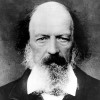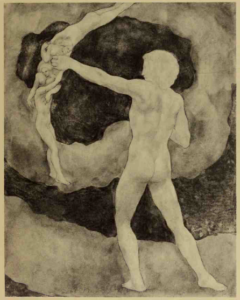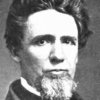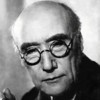ARIDÄUS: What is a hero without love for mankind?
[Was ist ein Held ohne Menschenliebe?]
Gotthold Lessing (1729-1781) German playwright, philosopher, dramaturg, writer
Philotas, Act 1, sc. 7 (1759) [tr. Heitner (1963)]
(Source)
Often misattributed to Doris Lessing (as with so many other Gotthold Lessing quotes).
(Source (German)). Alternate translation:
What is a hero void of human love?
[tr. Bohn's (1878)]
There are such things as to speak well, to speak easily, to speak correctly, and to speak seasonably. We offend against the last way of speaking if we mention a sumptuous entertainment we have just been present at before people who have not had enough to eat; if we boast of our good health before invalids; if we talk of our riches, our income, and our fine furniture to a man who has not so much as an income or a dwelling; in a word, if we speak of our prosperity before people who are wretched; such a conversation is too much for them, and the comparison which they then make between their condition and ours is very painful.
[Il y a parler bien, parler aisément, parler juste, parler à propos. C’est pécher contre ce dernier genre que de s’étendre sur un repas magnifique que l’on vient de faire, devant des gens qui sont réduits à épargner leur pain; de dire merveilles de sa santé devant des infirmes; d’entretenir de ses richesses, de ses revenus et de ses ameublements un homme qui n’a ni rentes ni domicile; en un mot, de parler de son bonheur devant des misérables: cette conversation est trop forte pour eux, et la comparaison qu’ils font alors de leur état au vôtre est odieuse.]
Jean de La Bruyère (1645-1696) French essayist, moralist
The Characters [Les Caractères], ch. 5 “Of Society and Conversation [De la Société et de la Conversation],” § 23 (5.23) (1688) [tr. Van Laun (1885)]
(Source)
(Source (French)). Alternate translations:
Some men talk well, easily, justly, and to the purpose: those offend in the last kind, who speak of the Banquets they are to be at, before such as are reduc'd to spare their Bread; of sound Limbs, before the Infirm; of Demesnes and Revenues, before the Poor and Needy; of fine Houses and Furniture, before such as have neither Dwelling or Moveables: in a word, who speak of Prosperity, before the Miserable. This conversation is too strong for 'em, and the comparison you make between their condition and yours is odious.
[Bullord ed. (1696)]
There is speaking well, speaking easily, speaking justly, and speaking seasonably: 'Tis transgressing the last rule, to speak ofthe sumptuous Entertainments you have made, before such as are reduc'd to want of Bread; of a healthy Constitution of Body, before the Infirm; of Demesnes, Revenues and Furniture, before a Man who has neither Dwelling, Rents, nor Movables; in a word, to speak of your Prosperity before the Miserable: this Conversation is too strong from them, and the Comparison they make between their Condition and yours is odious.
[Curll ed. (1713)]
There is speaking well, speaking easily, speaking justly, and speaking seasonably: It is offending against the last, to speak of Entertainments before the Indigent; of sound Limbs and Health before the Infirm; of Houses and Lands before one who has not so much as a Dwelling; in a Word, to speak of your Prosperity before the Miserable; this Conversation is cruel, and the Comparison which naturally rises in them betwixt their Condition and yours is excruciating.
[Browne ed. (1752)]
There is a difference between speaking well, speaking easily, speaking with judgement and speaking opportunely. We fail in this last respect when we enlarge upon the splendid meal we have just enjoyed in front of people who have to be thrifty of their bread; or boast of our health in the presence of invalids; or talk about our wealth, our fortune and property to a man who has neither home nor income; in a word, when we speak of our happiness in front of those who are wretched; such conversation is too painful for them, and the comparison they are bound to make between your state and their own is intolerable.
[tr. Stewart (1970)]
Yet they, believe me, who await
No gifts from chance, have conquered fate.Matthew Arnold (1822-1888) English poet and critic
“Resignation,” The Strayed Reveller and Other Poems (1848)
(Source)
Speak not of wealth; I can’t admire a god
whom even the basest man can get into his hold.Euripides (485?-406? BC) Greek tragic dramatist
Æolus [Αἴολος], frag. 20 (TGF)
(Source)
Nauck frag. 20, Barnes frag. 15, Musgrave frag. 14. (Source (Greek)). Alternate translations:
Talk not of Plutus; I despise the God
Whom every villain may with ease possess.
[tr. Wodhull (1809)]
I am, somehow, less interested in the weight and convolutions of Einstein’s brain than in the near certainty that people of equal talent have lived and died in cotton fields and sweatshops.
Stephen Jay Gould (1941-2002) American paleontologist, geologist, biologist
The Panda’s Thumb, Part 4, ch. 13 “Wide Hats and Narrow Minds” (1980)
(Source)
No play is rubbish if it pleases and if it takes money at the door.
Getting what you go after is success; but liking it while you are getting it is happiness.
Bertha Damon (1881-1975) American humorist, author, lecturer, editor [Bertha Clark Pope Damon]
A Sense of Humus, ch. 13 “Garden Sass” (1943)
(Source)
How dull it is to pause, to make an end,
To rust unburnish’d, not to shine in use!
As tho’ to breathe were life. Life piled on life
Were all too little, and of one to me
Little remains: but every hour is saved
From that eternal silence, something more,
A bringer of new things; and vile it were
For some three suns to store and hoard myself,
And this gray spirit yearning in desire
To follow knowledge, like a sinking star,
Beyond the utmost bound of human thought.
Vanity is a weakness. I know this. It’s a shallow dependence on the exterior self, on how one looks instead of what one is. I know this well. But I have a scar the size and texture of a jellyfish on my abdomen already, and you’d be surprised how your sense of self changes when you can’t take your shirt off at the beach. In my more private moments, I pull up my shirt and look at it, tell myself it doesn’t matter, but every time a woman has felt it under her palm late at night, propped herself up on a pillow and asked me about it, I’ve made my explanation as quick as possible, closed the doors to my past as soon as they’ve opened, and not once, even when Angie’s asked, have I told the truth. Vanity and dishonesty may be vices, but they’re also the first forms of protection I ever knew.
Dennis Lehane (b. 1965) American novelist, screenwriter
A Drink Before the War, ch. 7 [Kenzie] (1996)
(Source)
Writing, printing, and the Internet give a false sense of security about the permanence of culture. Most of the million details of a complex, living culture are transmitted neither in writing nor pictorially. Instead, cultures live through word of mouth and example. That is why we have cooking classes and cooking demonstrations, as well as cookbooks. That is why we have apprenticeships, internships, student tours, and on-the-job training as well as manuals and textbooks. Every culture takes pains to educate its young so that they, in their turn, can practice and transmit it completely. Educators and mentors, whether they are parents, elders, or schoolmasters, use books and videos if they have them, but they also speak, and when they are most effective, as teachers, parents, or mentors, they also serve as examples.
Jane Jacobs (1916-2006) American-Canadian journalist, author, urban theorist, activist
Dark Age Ahead, ch. 1 “The Hazard” (2004)
(Source)
But we should not think that we ought not to learn literature because Mercury is said to be its inventor, nor that because the pagans dedicated temples to Justice and Virtue and adored in stones what should be performed in the heart, we should therefore avoid justice and virtue. Rather, every good and true Christian should understand that wherever he may find truth, it is his Lord’s.
[Neque enim et litteras discere non debuimus quia earum repertorem dicunt esse Mercurium, aut quia iustitiae virtutique templa dedicarunt, et quae corde gestanda sunt in lapidibus adorare maluerunt, propterea nobis iustitia virtusque fugienda est. Immo vero quisquis bonus verusque Christianus est, Domini sui esse intellegat.]
Augustine of Hippo (354-430) Christian church father, philosopher, saint [b. Aurelius Augustinus]
On Christian Doctrine [De Doctrina Christiana], Book 2, ch. 18 / § 28 (2.18.28) (AD 397) [tr. Robertson (1958)]
(Source)
(Source (Latin)). Alternate translations:
For we ought not to refuse to learn letters because they say that Mercury discovered them; nor because they have dedicated temples to Justice and Virtue, and prefer to worship in the form of stones things that ought to have their place in the heart, ought we on that account to forsake justice and virtue. Nay, but let every good and true Christian understand that wherever truth may be found, it belongs to his Master.
[tr. Shaw (1858)]
We were not wrong to learn the alphabet just because they say Mercury was its patron, nor should we avoid justice and virtue just because they dedicated temples to justice and virtue and preferred to honour these values not in their minds, but in the form of stones. A person who is a good and a true Christian should realize that truth belongs to his Lord, wherever it is found.
[tr. Green (1995)]
When a twelfth-century youth fell in love he did not take three paces backward, gaze into her eyes, and tell her she was too beautiful to live. He said he would step outside and see about it. And if, when he got out, he met a man and broke his head — the other man’s head, I mean — then that proved that his — the first fellow’s — girl was a pretty girl. But if the other fellow broke his head — not his own, you know, but the other fellow’s — the other fellow to the second fellow, that is, because of course the other fellow would only be the other fellow to him, not the first fellow who — well, if he broke his head, then his girl — not the other fellow’s, but the fellow who was the — Look here, if A broke B’s head, then A’s girl was a pretty girl; but if B broke A’s head, then A’s girl wasn’t a pretty girl, but B’s girl was. That was their method of conducting art criticism.
Jerome K. Jerome (1859-1927) English writer, humorist [Jerome Klapka Jerome]
Idle Thoughts of an Idle Fellow, “On Being Idle” (1886)
(Source)
MESSENGER: I see, lady, the gentleman is not in your books.
BEATRICE: No. An he were, I would burn my study.
William Shakespeare (1564-1616) English dramatist and poet
Much Ado About Nothing, Act 1, sc. 1, l. 76ff (1.1.76-78) (1598)
(Source)
There are more who want to be loved than who want to love.
[Y a plus de gens qui veulent être aimés que de gens qui veulent aimer eux-mêmes.]Nicolas Chamfort (1741-1794) French writer, epigrammist (b. Nicolas-Sébastien Roch)
Products of Perfected Civilization [Produits de la Civilisation Perfectionée], Part 1 “Maxims and Thoughts [Maximes et Pensées],” ch. 6, ¶ 360 (1795) [tr. Merwin (1969)]
(Source)
(Source (French)). Alternate translations:
There are more people who wish to be loved than there are who are willing to love.
[Source (<1884)]
Men are more eager to be loved than anxious to love.
[tr. Mathers (1926)]
There are more people who want to be loved than there are people who want to love.
[tr. Dusinberre (1992)]
There are more people who want to be loved than people who want to love.
[tr. Siniscalchi (1994)]
Most agree that books worth reading are worth reading more than once.
Holbrook Jackson (1874-1948) English journalist, editor, author
The Anatomy of Bibliomania, Vol. 1, Part 11, ch. 7 “Readers Who Never Weary” (1930)
(Source)
Often misquoted as "... are worth re-reading."
Our virtues are usually only vices in disguise.
[Nos vertus ne sont le plus souvent que des vices déguisés]
François VI, duc de La Rochefoucauld (1613-1680) French epigrammatist, memoirist, noble
Réflexions ou sentences et maximes morales [Reflections; or Sentences and Moral Maxims], Epigraph (1675 ed.) [tr. Tancock (1959)]
(Source)
Added as an epigraph to the entire work in the 4th (1675) edition. A common theme in La Rochefoucauld's work, and variations of this maxim (and related thoughts) had been in the preceding editions and even this and later (see also ¶442).
(Source (French)). Alternate translations:
Our Vertues are oftentimes in Reality no better than Vices disguised.
[tr. Stanhope (1694)]
Our virtues are most frequently but vices disguised.
[tr. Bund/Friswell (1871)]
Our virtues are mostly but vices in disguise.
[tr. FitzGibbon (1957)]
Our virtues, most often, are only vices disguised.
[tr. Whichello (2016)]
Old age is like an opium-dream. Nothing seems real except what is unreal.
Oliver Wendell Holmes, Sr. (1809-1894) American poet, essayist, scholar
Over the Teacups, ch. 2 “To the Reader” (1891)
(Source)
It is by going down into the abyss
that we recover the treasures of life.Where you stumble,
there lies your treasure.The very cave you are afraid to enter
turns out to be the source of
what you are looking for.
The damned thing in the cave
that was so dreaded
has become the center.Joseph Campbell (1904-1987) American writer, professor of literature
In Diane K. Osbon, ed., Reflections on the Art of Living: A Joseph Campbell Companion, “In the Field” (1991)
(Source)
Quoted extensively, and mis-cited to a variety of Campbell's published works. I have not been able to confirm a primary source for it.
O the times! O the manners!
[O tempora, o mores!]
Marcus Tullius Cicero (106-43 BC) Roman orator, statesman, philosopher
Orationes in Catilinam [Catilinarian Orations], No. 1, § 1, cl. 2 (1.1.2) (63-11-08 BC) [tr. Mongan (1879)]
(Source)
(Source (Latin)). Alternate translations:
Oh what times! what a world do we live in!
[tr. Wase (1671)]
But O degenerate times!
[tr. Sydney (1795)]
Shame on the age and on its principles!
[tr. Yonge (1856)]
O the times! O the manners.
[tr. Underwood (1885)]
O times! O manners!
[tr. Dewey (1916)]
What a scandalous commentary on our age and its standards!
[tr. Grant (1960)]
O what times (we live in)! O what customs (we pursue)!
[IB Notes]
What times! What morals!
[Source]
Teachers are expected to reach unattainable goals with inadequate tools. The miracle is that at times they accomplish this impossible task.
Haim Ginott (1922-1973) Israeli-American school teacher, child psychologist, psychotherapist [b. Haim Ginzburg]
Teacher and Child, Preface (1972)
(Source)
If you are looking after happiness don’t take the turnpike, take one ov the byroads, yu will avoid the tollgates, and find it less crowded and dursty.
[If you are looking after happiness, don’t take the turnpike, take one of the byroads; you will avoid the tollgates, and find it less crowded and dusty.]
Josh Billings (1818-1885) American humorist, aphorist [pseud. of Henry Wheeler Shaw]
Everybody’s Friend, Or; Josh Billing’s Encyclopedia and Proverbial Philosophy of Wit and Humor, ch. 132 “Affurisms: Chips” (1874)
(Source)
The moral thing I wish to say to [future generations] is very simple. I should say love is wise, hatred is foolish. In this world which is getting more and more closely interconnected, we have to learn to tolerate each other. We have to learn to put up with the fact that some people say things that we don’t like. We can only live together in that way, and if we are to live together and not die together we must learn the kind of charity and kind of tolerance which is absolutely vital to the continuation of human life on this planet.
Bertrand Russell (1872-1970) English mathematician and philosopher
Interview by John Freeman, Face to Face, BBC TV (1959-03-04)
(Source)
Scars have the strange power to remind us that our past is real. The events that cause them can never be forgotten, can they?
Cormac McCarthy (1933-2023) American novelist, playwright, screenwriter
All the Pretty Horses (1992)
(Source)
You are the bows from which your children as living arrows are sent forth.
The Archer sees the mark upon the path of the infinite, and He bends you with His might that His arrows may go swift and far.
Let your bending in the Archer’s hand be for gladness;
For even as He loves the arrow that flies, so He loves also the bow that is stable.Kahlil Gibran (1883-1931) Lebanese-American poet, writer, painter [Gibran Khalil Gibran]
“On Children,” The Prophet (1923)
(Source)
Christians are beginning to lose the spirit of intolerance which animated them: experience has shown the error of the expulsion of the Jews from Spain, and of the persecution of those Christians in France whose belief differed a little from that of the king. They have realized that zeal for the advancement of religion is different from a due attachment to it; and that in order to love it and fulfill its behests, it is not necessary to hate and persecute those who are opposed to it.
[On commence à se défaire parmi les chrétiens de cet esprit d’intolérance qui les animoit : on s’est mal trouvé en Espagne, de les avoir chassés, et en France, d’avoir fatigué des chrétiens dont la croyance différoit un peu de celle du prince. On s’est aperçu que le zèle pour les progrès de la religion est différent de l’attachement qu’on doit avoir pour elle ; et que, pour l’aimer et l’observer, il n’est pas nécessaire de haïr et de persécuter ceux qui ne l’observent pas.]
Charles-Lewis de Secondat, Baron de Montesquieu (1689-1755) French political philosopher
Persian Letters [Lettres Persanes], Letter 60, Usbek to Ibben (1721) [tr. Davidson (1891)]
(Source)
Referring to the expulsion of Jews from Spain in 1492, and the persecution of the Huguenots (Protestants) in France culminating under Louis XIV in the late 17th Century (and who were still being persecuted while Montesquieu was writing this).
(Source (French)). Alternate translations:
The Christians begin to lay aside that untolerating Spirit, which used to sway them: the Spaniards are sensible how much they have lost by driving the Jews out, and the French by vexing of Christians whose Belief differed a little from that of the Prince. They are now convinced that the Zeal for the Progress of a Religion, is very different form the Devotion she requires; and that to love and observe her, there is no manner of Necessity for hating and persecuting those who do not.
[tr. Ozell (1736), Letter 58]
Christians begin to lay aside that intolerating spirit which formerly influenced them. Spain hath experienced the bad consequence of having expelled the Jews, and France of having worried the Christians, whose faith differed a little from that of the prince. They are nos sensible that a zeal for the progress of religion is different from that attachment which ought to be preserved towards her; and that, in order to love and obey her, it is not necessary to hate and persecute those who do not regard her.
[tr. Floyd (1762)]
Christians are fast losing that spirit of intolerance which formerly animated them: they are beginning to find out that the expulsion of the Jews from Spain was a mistake, and that the persecution of Christians in France whose beliefs differed a little from those of their sovereign was another. They have discovered that fanatic zeal for the advancement of a religion is far different from the attachment which every one ought to feel towards it, and that, in order to love and practise its precepts, it is not necessary to hate and afflict those who refuse to do so.
[tr. Betts (1897)]
The Christians are beginning to lose that spirit of intolerance which animated them. It is now seen that it was a mistake to chase the Jews from Spain, and to persecute French Christians whose belief differed a bit from that of the king. They now perceive that zeal for the expansion of religion is different from dutiful devotion to it, and that love and observance of a religion need not require hatred and persecution of those who do not so believe.
[tr. Healy (1964)]
Christians are beginning to abandon that spirit of intolerance which formerly inspired them; the Spanish regret having banished the Jews, and the French regret having persecuted Christians whose beliefs differed slightly from those of their monarch. They have realized that zeal for the advancement of religion is different form the love one should bear it, and that in order to love it, and observe its precepts, there is no need to hate and persecute those who do not do so.
[tr. Mauldon (2008), Letter 58]
The Christians are beginning to abandon that old spirit of religious intolerance; it was a mistake to expel the Jews from Spain, just as it was to persecute the Christians in France whose beliefs differed only slightly from those of their king. They have realized here that zeal for the advancement of one's religion is different from the attachment one ought to have for it, and that to love and observe one's faith, it is not necessary to hate and persecute those who do not observe it.
[tr. MacKenzie (2014)]
Make love your aim, not biblical inerrancy, nor purity nor obedience to holiness codes. Make love your aim, for
“Though I speak with the tongues of men and of angels” — musicians, poets, preachers, you are being addressed.
“and though I … understand all mysteries, and all knowledge” — professors, your turn,
“and though I bestow all my goods to feed the poor” — radicals take note;
“and though I give my body to be burned” — the very stuff of heroism;
“and have not charity, it profiteth me nothing.” (1 Cor. 13:1-3 KJV).I doubt if any other scriptures of the world there is a more radical statement of ethics. If we fail in love, we fail in all things else.
William Sloane Coffin, Jr. (1924-2006) American minister, social activist
Credo, “Faith, Hope, Love” (2004)
(Source)
When you take the wires of the cage apart, you do not hurt the bird, but help it. You let it out of its prison. How do vou know that death does not help me when it takes the wires of my cage down? — that it does not release me, and put me into some better place, and better condition of life?
Randolph S. Foster (1820-1903) American Methodist Episcopal bishop, preacher, educator
“Man a Spiritual Being,” Lecture 2, Chautauqua, New York (1878)
(Source)
Collected in his Beyond the Grave: Being Three Lectures Before Chautauqua Assembly in 1878 (1879).
Do not let us speak of darker days: let us speak rather of sterner days. These are not dark days; these are great days — the greatest days our country has ever lived; and we must all thank God that we have been allowed, each of us according to our stations, to play a part in making these days memorable in the history of our race.
Winston Churchill (1874-1965) British statesman and author
Speech, Harrow School, England (1941-10-29)
(Source)
It may be that we have become so feckless as a people that we no longer care how things do work, but only what kind of quick, easy outer impression they give. If so, there is little hope for our cities or probably for much else in our society. But I do not think this is so.
Jane Jacobs (1916-2006) American-Canadian journalist, author, urban theorist, activist
The Death and Life of Great American Cities, Introduction (1961)
(Source)
Strephon kissed me in the spring,
Robin in the fall,
But Colin only looked at me
And never kissed at all.Strephon’s kiss was lost in jest,
Robin’s lost in play,
But the kiss in Colin’s eyes
Haunts me night and day.
But the ambiguities of metaphorical words, about which I am next to speak, demand no ordinary care and diligence. In the first place, we must beware of taking a figurative expression literally. For the saying of the apostle applies in this case too: “The letter killeth, but the spirit giveth life.”
[Sed verborum translatorum ambiguitates, de quibus deinceps loquendum est, non mediocrem curam industriamque desiderant. Nam in principio cavendum est ne figuratam locutionem ad litteram accipias. Et ad hoc enim pertinet quod ait Apostolus: Littera occidit, spiritus autem vivificat.]Augustine of Hippo (354-430) Christian church father, philosopher, saint [b. Aurelius Augustinus]
On Christian Doctrine [De Doctrina Christiana], Book 3, ch. 5 / § 9 (3.5.9) (AD 397) [tr. Shaw (1858)]
(Source)
Quoting 2 Cor. 3:6.
(Source (Latin)). Alternate translations:
But the ambiguities of figurative words, which are now to be treated, require no little care and industry. For at the outset you must be very careful lest you take figurative expressions literally. What the apostle says pertains to this problem: "For the letter killeth, but the spirit quickeneht."
[tr. Robertson (1958)]
But the ambiguities of metaphorical words, about which I must now speak, require no ordinary care and attention. To begin with, one must take care not to interpret a figurative expression literally. What the apostle says is relevant here: "the letter kills but the spirit gives life."
[tr. Green (1995)]
BEATRICE: He wears his faith but
as the fashion of his hat; it ever changes with the
next block.William Shakespeare (1564-1616) English dramatist and poet
Much Ado About Nothing, Act 1, sc. 1, l. 73ff (1.1.73-75) (1598)
(Source)
You should swallow a toad every morning, when going out into high society, so as to encounter nothing more disgusting during the day.
[Faudrait avaler un crapaud tous les matins, pour ne trouver plus rien de dégoûtant le reste de la journée, quand on devait la passer dans le monde.]Nicolas Chamfort (1741-1794) French writer, epigrammist (b. Nicolas-Sébastien Roch)
Products of Perfected Civilization [Produits de la Civilisation Perfectionnée], Part 2 “Characters and Anecdotes [Caractères et Anecdotes],” ch. 5 (1795) [tr. Dusinberre (1992)]
(Source)
Though usually attributed directly to Chamfort, he credits the phrase to a M. de Lassay.
Fragment 863. (Source (French)). Alternate translations:
It would be necessary to swallow a toad every morning, in order not to find anything disgusting the rest of the day, when one has to spend it in the world.
[tr. Matthews (1877)]
One must swallow a toad every morning, when one has to go out in the world, so as not to find anything more disgusting during the day.
[tr. Merwin (1969)]
Swallow a toad in the morning and you will encounter nothing more disgusting the rest of the day.
[Source]
Indeed, it is a cruel truth of the history of all art and literature that most would-be poets, writers, and painters fail. The man or woman of real talent is rare, the born genius rarer still. For every book that survives the merciless judgment of time, there are nine hundred and ninety-nine rotting unread in libraries and nine thousand and ninety-nine that were never written in the first place.
Michael Harrington (1928-1989) American writer, political activist, political scientist [Edward Michael Harrington, Jr.]
Fragments of the Century, ch. 2 “The Death of Bohemia” (1973)
(Source)
It is erroneous to tie down individual genius to ideal models. Each person should do that, not which is best in itself, even supposing this could be known, but that which he can do best, which he will find out if left to himself. Spenser could not have written Paradise Lost, nor Milton the Faerie Queene. Those who aim at faultless regularity will only produce mediocrity, and no one ever approaches perfection except by stealth, and unknown to themselves.
William Hazlitt (1778-1830) English writer
“Thoughts on Taste,” Edinburgh Magazine (1819-07)
(Source)
The years swarm around me like midges, and though each tiny bite only costs me a single drop of blood, they are so thick I am nearly bled dry.
Stephen L. Burns (b. 1953) American author
“Redeemer’s Riddle,” Sword and Sorceress IV (1987) [ed. Marion Zimmer Bradley]
(Source)
Life is truly known only to those who suffer, lose, endure adversity, and stumble from defeat to defeat.
Ryszard Kapuściński (1932-2007) Polish journalist, photographer, poet, author
“A Warsaw Diary,” Granta Magazine, No. 15 (1985 Spring)
(Source)
I have come to the frightening conclusion that I am the decisive element in the classroom. It is my personal approach that creates the climate. It is my daily mood that makes the weather. As a teacher, I possess a tremendous power to make a child’s life miserable or joyous. I can be a tool of torture or an instrument of inspiration. I can humiliate or humor, hurt or heal. In all situations, it is my response that decides whether a crisis will be escalated or de-escalated, a child humanized or de-humanized.
Haim Ginott (1922-1973) Israeli-American school teacher, child psychologist, psychotherapist [b. Haim Ginzburg]
Teacher and Child, Preface (1972)
(Source)
Quoting his writing as a young teacher.
No solitary miscreant, scarcely any solitary maniac, would venture on such actions and imaginations, as large communities of sane men have, in such circumstances, entertained as sound wisdom.
Thomas Carlyle (1795-1881) Scottish essayist and historian
“Signs of the Times,” Edinburgh Review No. 98, Art. 7 (1829-06)
(Source)
A complaint that’s not looking for a solution is a disease not looking for a cure.
Dennis Lehane (b. 1965) American novelist, screenwriter
Since We Fell (2017)
(Source)
A frequent saying of the character Brian Delacroix.
When, O Catiline, do you mean to cease abusing our patience? How long is that madness of yours still to mock us? When is there to be an end of that unbridled audacity of yours, swaggering about as it does now?
[Quo usque tandem abutere, Catilina, patientia nostra? Quam diu etiam furor iste tuus nos eludet? Quem ad finem sese effrenata iactabit audacia?]
Marcus Tullius Cicero (106-43 BC) Roman orator, statesman, philosopher
Orationes in Catilinam [Catilinarian Orations], No. 1, § 1, cl. 1 (1.1.1) (63-11-08 BC) [tr. Yonge (1856)]
(Source)
Urging Catiline, leader of a conspiracy against the Roman government, to leave the city.
(Source (Latin)). Alternate translations:
How long, Catiline, will you abuse our patience? How long shall that fury of yours hector down even us too? To what bound shall your unbridled Audaciousness fly out?
[tr. Wase (1671)]
How long, Catiline, will you dare to abuse our patience? how long are we to be the sport of your frantic fury? to what extremity do you mean to carry your unbridled insolence?
[tr. Sydney (1795)]
How far at length, O Catiline! wilt thou trifle with our patience? How long still shall that frenzy of thine baffle us? To what limit shall they uncurbed effrontery boastfully display itself?
[tr. Mongan (1879)]
How far at length wilt thou abuse with our patience, O Catiline? How long also that thy fury will elude us? To what end thy unbridled audacity will boast itself?
[tr. Underwood (1885)]
How much further, Catilina, will you carry your abuse of our forbearance? How much longer will your reckless temper baffle our restraint? What bounds will you set to this display of your uncontrolled audacity?
[tr. Blakiston (1894)]
How far at length will you abuse, O Catiline, our patience? How long also will that fury of yours elude us? To what end will that unbridled audacity flaunt itself?
[tr. Dewey (1916)]
In the name of heaven, Catilina, how long do you propose to exploit our patience? Do you really suppose that your lunatic activities are going to escape our retaliation for evermore? Are there to be no limits to this audacious, uncontrollable swaggering?
[tr. Grant (1960)]
How far will you continue to abuse our patience, Catiline? For how much longer will that rage of yours make a mockery of us? To what point will your unbridled audacity show itself?
[IB Notes]
Now must I go. The shade of this juniper turns chill.
Shade stunts a crop, and it’s bad for a singer’s voice. My goats,
You have pastured well, the twilight deepens — home then, home!
[Surgamus; solet esse gravis cantantibus umbra;
iuniperi gravis umbra; nocent et frugibus umbrae.
Ite domum saturae, venit Hesperus, ite capellae.]Virgil (70-19 BC) Roman poet [b. Publius Vergilius Maro; also Vergil]
Eclogues [Eclogae, Bucolics, Pastorals], No. 10 “Gallus,” l. 75ff (10.75-77), closing lines (42-38 BC) [tr. Day Lewis (1963)]
(Source)
(Source (Latin)). Alternate translations:
Let us arise; shades oft hurt those who sing;
Juniper shades are to our fruit a foe,
The Evening comes, goe home, my fed Kids, goe.
[tr. Ogilby (1649)]
Now let us rise, for hoarseness oft invades
The Singer's Voice, who sings beneath the Shades.
From Juniper, unwholesome Dews distill,
That blast the sooty Corn; the with'ring Herbage kill;
Away, my Goats, away: for you have browz'd your fill.
[tr. Dryden (1709), l. 110ff]
Rise we; shades, e'en of juniper, annoy
The minstrel choir, the ripening grain destroy:
Goats, from your pastures sated, homeward hie --
See, where bright Hesper fires the evening sky!
[tr. Wrangham (1830), l. 81ff]
Let us arise: the shade is wont to prove noxious to singers; the juniper's shade now grows noxious; the shades are hurtful even to the corn. Go home, the evening star arises, my full-fed goats, go home.
[tr. Davidson (1854)]
I rise. The shadows are the singer's bane:
Baneful the shadow of the juniper.
E'en the flocks like not shadow. Go -- the star
Of morning breaks -- go home, my full-fed sheep.
[tr. Calverley (c. 1871)]
Let us rise: shade is often dangerous to those who sit and sing; there is danger in the juniper's shade: why, shade hurts the crops too. Go home, the evening star is rising: my well-fed goats, go home.
[tr. Wilkins (1873)]
Now, enemy to vine and fruit,
The dews descend; the shadows fall
And homeward flocks and shepherds call.
[tr. King (1882), ll. 1018ff]
But let us rise, for never voice was made,
Nor verse, more tuneful by a chilling shade,
To man distasteful and the ripening field:
Such, even junipers at nightfall yield.
Now pales the latest crimson of the West:
Gather yon batten'd herd, I bring the rest;
And then wind homeward in the dying light;
Homeward my goats, for Hesperus is bright.
[tr. Palmer (1883)]
Come, let us rise: the shade is wont to be
baneful to singers; baneful is the shade
cast by the juniper, crops sicken too
in shade. Now homeward, having fed your fill --
eve's star is rising -- go, my she-goats, go.
[tr. Greenough (1895)]
Let us arise: the shade is wont to prove hurtful to singers; the juniper’s shade now grows noxious; the shades are damaging even to the crops. Go home, my full-fed goats; the evening star arises, go home.
[tr. Bryce (1897)]
Let us arise; the shade is wont to be heavy on singers: the juniper shade is heavy: shade too hurts the corn. Go home full-fed, the Evening Star comes, go, my she-goats.
[tr. Mackail (1899)]
Now let us rise; for singers it is ill
To linger in the shade—to the young corn
The junipers' deep shadow worketh harm;
The evening star shines forth -- now go, my goats,
Ye may return, full fed, towards your home.
[tr. Mackail/Cardew (1908)]
But let us go!
The darkness of the night works hurtful change
Upon a shepherd's voice; the junipers
Love not the darkness, and the ripening fields
Thrive not in shadow. Home ye mother-goats!
Run home full-fed! Behold the evening-star!
[tr. Williams (1915)]
Let us arise. The shade is oft perilous to the singer -- perilous the juniper’s shade, hurtful the shade even to the crops. Get home, my full-fed goats, get home -- the Evening Star draws on.
[tr. Fairclough (Loeb) (1916)]
Now let us go. The shade is bad for singers. This is a juniper: its shade is bad. Even crops suffer in the shade.
Home with you, goats: you have had your fill. Hesper is coming: home with you.
[tr. Rieu (1949)]
Now let us rise, the shade can be harmful to singers;
A juniper shade not only menaces mortals
But crops wilt under it. Turn, my goats, from feasting,
Come, for the Star of Evening glimmers, come home now.
[tr. Johnson (1960)]
Let's go then, friend.
This shade is bad for poetry. Our throats
are dry. Let's go home." In such a way,
I'd bring the pastoral to its natural end.
We could go together, herding the fucking goats.
[tr. Slavitt (1971)]
Now we must go; the shade's not good for singers,
The juniper shade's unwholesome; unwholesome too
For the plants that need the sunshine is the shade.
Go home, my full-fed goats, you've eaten your fill,
The Evening Star is rising; it's time to go home.
[tr. Ferry (1999)]
Let’s rise, the shade’s often harmful to singers,
the juniper’s shade is harmful, and shade hurts the harvest.
Hesperus is here, home you sated goats: go home.
[tr. Kline (2001)]
WYATT: Do you think that philosophy contribute to happiness?
RUSSELL: Yes, if you happen to be interested in philosophy and good at it, but not otherwise – but so does bricklaying. Anything you’re good at contributes to happiness.
Bertrand Russell (1872-1970) English mathematician and philosopher
Interview by Woodrow Wyatt, BBC TV (1959)
Collected in Bertrand Russell's BBC Interviews (1959) [UK] and Bertrand Russell Speaks His Mind (1960) [US].
Why, if all the rich men in the world divided up their money amongst themselves, there wouldn’t be enough to go round!
Christina Stead (1902-1983) Australian writer
House of All Nations, sc. 12 “The Revolution” [Jules] (1938)
(Source)
Pooh-poohing the idea that confiscating wealth from the rich would provide enough money to the poor. The line is also included in the "Credo" at the beginning of the novel, attributed to the character, Jules Bertillon.
Anyone who has raised more than one child knows full well that kids turn out the way they turn out — astonishingly, for the most part, and usually quite unlike their siblings, even their twins, raised under the same flawed rooftree.
Better slip with foot than tongue.
Benjamin Franklin (1706-1790) American statesman, scientist, philosopher, aphorist
Poor Richard (1734 ed.)
(Source)
All ways of expressing ourselves are good if they make us understood. Thus, if the clarity of our thoughts comes through better in a play of words, then the wordplay is good.
Joseph Joubert (1754-1824) French moralist, philosopher, essayist, poet
Pensées [Thoughts], 1805 (1850 ed.) [tr. Auster (1983)]
(Source)
Analog not found in standard translations of the Pensees.
As favour and riches forsake a man, we discover in him the foolishness they concealed, and which no one perceived before.
[À mesure que la faveur et les grands biens se retirent d’un homme, ils laissent voir en lui le ridicule qu’ils couvraient, et qui y était sans que personne s’en aperçût.]Jean de La Bruyère (1645-1696) French essayist, moralist
The Characters [Les Caractères], ch. 6 “Of Gifts of Fortune [Des Biens de Fortune],” § 4 (6.4) (1688) [tr. Van Laun (1885)]
(Source)
(Source (French)). Alternate translations:
When Riches and Favour forsake a Man, we see presently he was a Fool, but no body could find it out in his Prosperity.
[Bullord ed. (1696)]
In proportion as Riches and Favour forsake a Man, we discover he was a Fool, which no body cou'd find out in his Prosperity.
[Curll ed. (1713)]
As Riches and Favour forsake a Man, we discover him to be a Fool, but no body could find it out in his Prosperity.
[Browne ed. (1752)]
As a man falls out of favour and his wealth declines, we discover for the first time the ridiculous aspects of his character, which were always there but which wealth and favour had concealed.
[tr. Stewart (1970)]
AHASUERAS: I am content.
ESTHER: Content is not the pathway to great deeds.Ella Wheeler Wilcox (1850-1919) American author and poet.
“The Drama of Mizpah: Honeymoon Scene,” Poems of Progress (1909)
(Source)
Thou shalt no God but me adore:
‘Twere too expensive to have more.
No images nor idols make
For Robert Ingersoll to break.
Take not God’s name in vain; select
A time when it will have effect.
Work not on Sabbath days at all,
But go to see the teams play ball.
Honor thy parents. That creates
For life insurance lower rates.
Kill not, abet not those who kill;
Thou shalt not pay thy butcher’s bill.
Kiss not thy neighbor’s wife, unless
Thine own thy neighbor doth caress.
Don’t steal; thou’lt never thus compete
Successfully in business. Cheat.
Bear not false witness — that is low —
But “hear ’tis rumored so and so.”
Covet thou naught that thou hast not
By hook or crook, or somehow, got.Ambrose Bierce (1842-1914?) American writer and journalist
“Decalogue,” The Cynic’s Word Book (1906)
(Source)
Included in The Devil's Dictionary (1911). Originally published in the "Devil's Dictionary" column in the San Francisco Wasp (1881-12-02).
The poem is signed "G.J." in reference to Father Gassalasca Jape, S.J., a (fake) Jesuit priest Bierce often "cited" for poetry on religious topics. In his preface to The Devil's Dictionary (1911), he includes the note:
A conspicuous, and it is hoped not unpleasant, feature of the book is its abundant illustrative quotations from eminent poets, chief of whom is that learned and ingenious cleric, Father Gassalasca Jape, S.J., whose lines bear his initials. To Father Jape's kindly encouragement and assistance the author of the prose text is greatly indebted.
Robert Ingersoll was a famous agnostic and lecturer, frequently defended by Bierce in his newspaper columns.
In the original Wasp version, the Fourth Commandment read "Work not on Sabbath days at all, / Nor dare to read the Sunday Call." Bierce crowed in the next (1881-12-09) issue that at the same time as the poem was written, a newsdealer in Watsonville, Calif., was convicted of an infraction of the "Sunday Law" in selling that paper on the day of its publication. "We could hardly have hoped that our revised Decalogue would so soon be adopted as the law of the land."
Bierce returned to the theme in "The New Decalogue" (1887).
Have but one God: thy knees were sore
If bent in prayer to three or four.
Adore no images save those
The coinage of thy country shows.
Take not the Name in vain. Direct
Thy swearing unto some effect.
Thy hand from Sunday work be held --
Work not at all unless compelled.
Honor thy parents, and perchance
Their wills thy fortunes may advance.
Kill not -- death liberates thy foe
From persecution’s constant woe.
Kiss not thy neighbor’s wife. Of course
There’s no objection to divorce.
To steal were folly, for ’tis plain
In cheating there is greater gain.
Bear not false witness. Shake your head
And say that you have “heard it said.”
Who stays to covet ne’er will catch
An opportunity to snatch.
And what is shameful if those who do it don’t think it so?
[τί δ’ αἰσχρὸν ἢν μὴ τοῖσι χρωμένοις δοκῇ]
Euripides (485?-406? BC) Greek tragic dramatist
Æolus [Αἴολος], frag. 19 (TGF) [tr. Aleator (2012)]
(Source)
This bit of moral relativism (likely coming from Macareus, the son of Aeolus, who committed incest with his sister, Canace) continues to provoke commentary, thus varied translations. Aristophanes includes a reference to this line in his The Frogs.
Nauck frag. 19, Barnes frag. 5, Musgrave frag. 1. (Source (Greek)). Alternate translations:
But what is base, if it appear not base
To those who practice what their soul approves?
[tr. Wodhull (1809)]
What is shameful, if it does not seem to be so to those who do it?
[Source]
What's wrong if they who do it think not so?
[Source (1902)]
Why shameful, if it does not seem so to those who practice it?
[Source (2018)]
Most often people seek in life occasions for persisting in their opinions rather than for educating themselves.
André Gide (1869-1951) French author, Nobel laureate
“An Unprejudiced Mind,” sec. 1, Pretexts (1959) [ed. O’Brien (1964)]
(Source)
If we cut up beasts simply because they cannot prevent us and because we are backing our own side in the struggle for existence, it is only logical to cut up imbeciles, criminals, enemies, or capitalists for the same reasons.
C. S. Lewis (1898-1963) English writer, literary scholar, lay theologian [Clive Staples Lewis]
“Vivisection,” New England Anti-Vivisection Society pamphlet (1947)
(Source)
Collected in God in the Dock, Part 2, ch. 9 (1970) [ed. Hooper].
Historical sense and poetic sense should not, in the end, be contradictory, for if poetry is the little myth we make, history is the big myth we live, and in our living, constantly remake.
Robert Penn Warren (1905-1989) American poet, novelist, literary critic
Brother to Dragons, Foreword (1953)
(Source)
SanDeE*: I don’t put any pressure on you, do I?
HARRIS: Not at all … I don’t pressure you, do I?
SanDeE*: No, no, I just don’t think there should be any pressure.
HARRIS: No. Tell me if I pressure you.
SanDeE*: OK. And you too, but don’t feel like you have to.
Steve Martin (b. 1945) American comedian, actor, writer, producer, musician
L. A. Story (1991)
(Source)













































